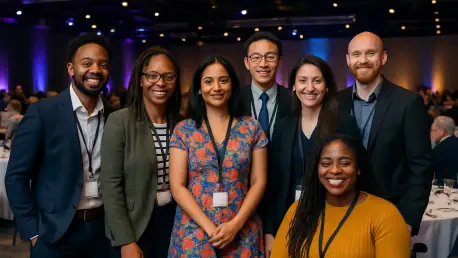What happens when talent is abundant, but opportunity remains out of reach for so many? In the events and hospitality industry, a staggering gap persists—only 11% of leadership roles are held by individuals from underrepresented ethnic backgrounds, according to a 2023 industry report by Eventbrite. This striking statistic reveals a systemic challenge that stifles innovation and limits the perspectives shaping memorable experiences worldwide. Yet, a transformative movement is gaining momentum, led by the Reach Events Scholarship Initiative in collaboration with the University of Greenwich. This partnership is not just a response to disparity but a bold step toward reshaping the future of events.
Why Diversity Matters in Events Today
The events industry is a powerhouse of creativity, driving economic impact and cultural exchange, yet it has often failed to mirror the diversity of the audiences it serves. Historical barriers, from socioeconomic constraints to limited access to professional networks, have sidelined countless aspiring professionals. Addressing this gap is no longer optional—it’s essential for fostering fresh ideas and ensuring events resonate with a global community.
Beyond ethics, there’s a practical edge to diversity. Studies, such as a 2022 McKinsey report, show that companies with diverse teams are 35% more likely to outperform their peers in innovation and financial returns. For an industry built on connection, embracing varied voices isn’t just a moral imperative but a competitive advantage that can redefine success.
The High Stakes of Inclusion in Hospitality
The journey to a career in events and hospitality can be daunting for those without the right resources or connections. Underrepresented groups often face hurdles like costly education, lack of mentorship, or unconscious bias in hiring practices. These challenges create a cycle where talent exists but struggles to break through.
Reach, now a pivotal force in its ongoing mission, is directly confronting these inequities through strategic alliances. By partnering with the University of Greenwich, an institution renowned for its diverse student population, Reach is creating a platform where barriers are dismantled. This collaboration aims to ensure the industry reflects the multifaceted world it engages, paving the way for lasting change.
Inside Reach’s Transformative Alliance with Greenwich
A landmark partnership between Reach and the University of Greenwich is set to redefine access to the events sector through targeted initiatives. One key focus is expanding annual scholarships from three to five between 2025 and 2027, offering more students from varied backgrounds a chance to pursue their dreams. This increase directly tackles financial obstacles that often deter potential talent.
Additionally, the alliance leverages Greenwich’s robust events and hospitality programs to deliver practical training and mentorship. Students gain hands-on experience while building connections with industry leaders, ensuring they’re not just educated but positioned for real-world success. The backing of DRPG, a creative communications agency, further strengthens this effort with vital financial and strategic support.
This partnership extends beyond immediate opportunities, aiming to build a sustainable network. Community engagement initiatives ensure that students are integrated into the professional sphere, breaking down long-standing entry barriers and setting a precedent for how educational and corporate collaborations can drive inclusivity.
Hearing from the Changemakers
The vision behind this initiative comes alive through the voices of its champions. Mary Ivers, Associate Director of External Engagement at the University of Greenwich, highlighted the tangible impact, stating, “This partnership equips students with essential skills and networks to excel in a challenging field.” Her words reflect a deep commitment to actionable progress.
Robert Kenward, co-founder of Reach, pointed to the initiative’s evolution, noting, “What started as a vision has become a measurable force for broadening access through structured, community-focused efforts.” Meanwhile, DRPG’s CEO, Dale Parmenter, reinforced the ethos driving their support: “Entry to this industry must be based on potential, not privilege.” These perspectives collectively affirm that diversity is a foundation for meaningful advancement.
Actionable Ways to Drive Diversity in Events
The model set by Reach and Greenwich offers practical lessons for anyone aiming to champion inclusivity in the events space. One effective approach is to collaborate with universities to identify and nurture diverse talent early, through internships or scholarship programs that lower financial barriers.
Securing corporate sponsorships, as exemplified by DRPG’s commitment, can amplify impact by providing resources and visibility. Another strategy involves creating mentorship opportunities or workshops to bridge the gap between academic training and industry entry, particularly for underrepresented groups. Finally, establishing long-term structures, like advisory boards inspired by Reach’s updated governance model, ensures that diversity efforts are not temporary but embedded in the industry’s fabric.
Reflecting on a Path Forward
Looking back, the collaboration between Reach and the University of Greenwich stood as a powerful catalyst for change in the events and hospitality sector. Their joint efforts tackled deep-rooted inequities with precision, from expanded scholarships to hands-on training that opened doors for diverse talent. The support of DRPG added a layer of strength, proving that corporate investment could align with social good.
Moving into the future, the challenge shifts to scaling these initiatives across more institutions and industries. Stakeholders are encouraged to replicate this blueprint—partnering with educational bodies, securing funding, and prioritizing mentorship—to ensure that opportunity matches talent. The momentum built by Reach and Greenwich serves as a reminder that systemic change is achievable when intention meets action.









